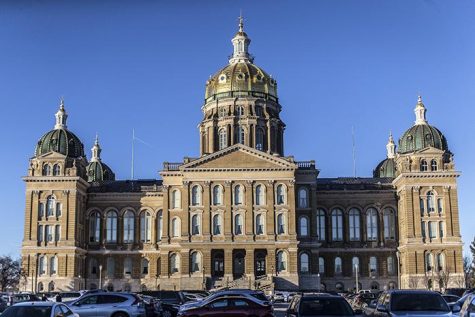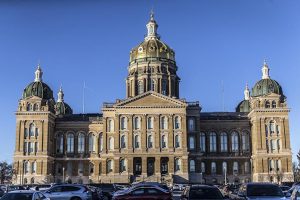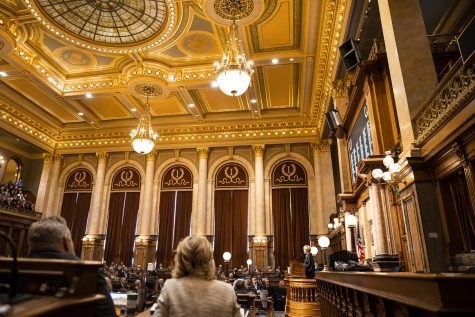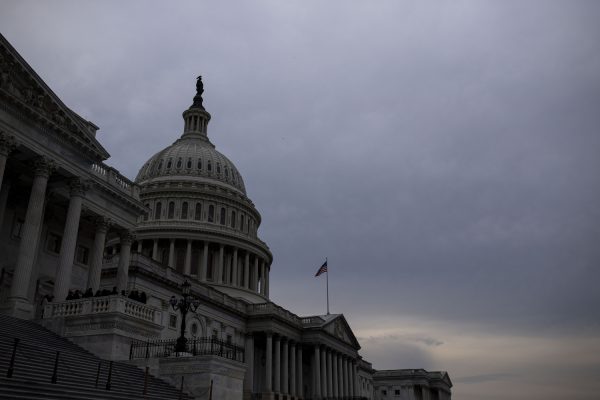Polk County judge rules Iowa’s fetal-heartbeat law unconstitutional
On the 46th anniversary of the U.S. Supreme Court’s landmark Roe v. Wade decision, a district court judge ruled Iowa’s fetal-heartbeat law unconstitutional.
ACLU Legal Director Rita Betis speaks to the press following the Heartbeat Bill hearing at the Polk County Courthouse on Friday, Dec. 7, 2018.
January 22, 2019
A 5th District Court judge struck down Iowa’s 2018 law that would ban most abortions after a heartbeat is detected.
Fifth District Court Judge Michael Huppert ruled the law to be unconstitutional on Tuesday, preventing the law from going into effect, following a hearing in early December.
The legal challenge came from Planned Parenthood of the Heartland, the Iowa City-based Emma Goldman Clinic, and the American Civil Liberties Union of Iowa. Those groups filed a lawsuit soon after the state Legislature signed the bill into law.
The plaintiffs alleged that the law “is patently unconstitutional and would gravely harm Iowa women if allowed to take effect” in the December hearing.
Related: Heartbeat bill temporarily blocked lawsuit continues
A lawyer from the Thomas Moore Society, which often defends laws that restrict abortions, represented the state of Iowa. The lawyer argued the law didn’t ban abortions, but required abortions to be done earlier.
Huppert ruled in favor of Planned Parenthood of the Heartland and others’ motion for summary judgment, meaning the facts of the case were not disputed, allowing the judge to make a decision without a larger trial.
The Iowa Supreme Court held that a woman’s right to decide whether to terminate a pregnancy is a fundamental right under the Iowa Constitution, and that any governmental limits on that right are to be analyzed using strict scrutiny.
— Judge Michael Huppert
The law, passed during the 2018 legislative session, was supposed to go into effect July 1, 2018, but was on hold due to the lawsuit that had been filed.
It would require that physicians perform an ultrasound on a mother, and if a heartbeat is detected, the doctor would be banned from performing the abortion. A heartbeat can be detected as early as six weeks into pregnancy.
Related: Iowa Supreme Court backs pro-choice protection
In his ruling, Huppert referenced a previous case where the Iowa Supreme Court ruled that a mandatory 72-hour waiting period for all women seeking an abortion violates the state constitution. The waiting period requirement was a part of a law passed in 2017.
“The Iowa Supreme Court held that a woman’s right to decide whether to terminate a pregnancy is a fundamental right under the Iowa Constitution, and that any governmental limits on that right are to be analyzed using strict scrutiny,” Huppert wrote in his decision.
Iowa Gov. Kim Reynolds, a Republican who signed the bill into law, said she was “disappointed” in Tuesday’s ruling.
“I am incredibly disappointed in today’s court ruling, because I believe that if death is determined when a heart stops beating, then a beating heart indicates life,” she said through an emailed statement to The Daily Iowan.
Medical Director for the Planned Parenthood of the Heartland Jill Meadows called the ruling a “victory for every Iowan who has ever needed or will need a safe, legal abortion.”
The ruling comes on the 46th anniversary of the U.S. Supreme Court’s landmark Roe v. Wade decision that legalized abortion across the country, Francine Thomas, executive director of the Emma Goldman Clinic, noted in a statement.
“It is befitting that as we celebrate the anniversary of Roe v Wade, our clients can continue to rely on access to first and second trimester abortions at the Emma Goldman Clinic,” Thomas said in the prepared statement.





















